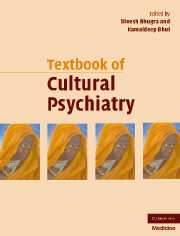Book contents
- Frontmatter
- Contents
- Contributors
- Foreword
- Preface
- Part I Theoretical background
- Part II Culture and mental health
- Part III Culture and mental disorders
- Part IV Theoretical aspects of management
- Part V Management with special groups
- Part VI Cultural research and training
- 41 Scope of cultural psychiatry
- 42 Coping with stressors: racism and migration
- Cultural psychiatry: the past and the future
- Index
- References
41 - Scope of cultural psychiatry
from Part VI - Cultural research and training
Published online by Cambridge University Press: 11 August 2009
- Frontmatter
- Contents
- Contributors
- Foreword
- Preface
- Part I Theoretical background
- Part II Culture and mental health
- Part III Culture and mental disorders
- Part IV Theoretical aspects of management
- Part V Management with special groups
- Part VI Cultural research and training
- 41 Scope of cultural psychiatry
- 42 Coping with stressors: racism and migration
- Cultural psychiatry: the past and the future
- Index
- References
Summary
EDITORS' INTRODUCTION
Cultural psychiatry by definition examines the psychology and behaviour of an individual, which is linked with identity and acculturation and allows an individual to respond to stressors in a way that is sanctioned by the cultures within which he lives and from which he may have emerged. The need for an academic discipline such as cultural psychiatry emerges from the position of relativism that anthropology advocates. The healthy, creative tension between anthropology and psychiatry is discussed elsewhere in this volume, but it is essential that cultural psychiatry leads in understanding the role cultural factors play when meanings of distress are to be ascertained. Furthermore, linguistic, social, ethnic and religious mores embedded in cultures are to be understood in the context of making sense of experiences that form part of psychiatric conditions.
In this chapter, Fabrega examines cultural influences in diverse circumstances relevant to psychiatry. Starting with the question of why cultural psychiatry is special: because, firstly, psychiatric disorders, unlike medical disorders, are not entirely internal but its epistemology is different too, thereby ensuring that the emphasis of cultural psychiatry is synchronic. While it stresses diverse and dynamic aspects of clinical disorders, psychiatry addressed stationary happenings in a specific historic moment. Fabrega notes that, under these circumstances, cultural psychiatry has a daunting task and enormous relevance given movements and mixing of populations across geographic settings and cultural diversity of human populations. In an impeccable argument, Fabrega emphasizes that what cultural psychiatry ‘is’ and ‘does’ is certainly not linked to concrete and clinically relevant exigencies.
- Type
- Chapter
- Information
- Textbook of Cultural Psychiatry , pp. 537 - 549Publisher: Cambridge University PressPrint publication year: 2007



